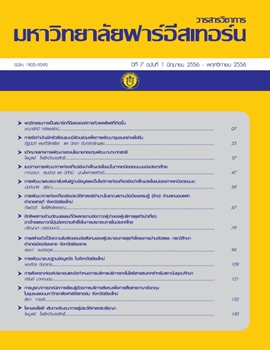การบูรณาการเทคนิคการเรียนรู้ด้วยการบริการสังคมเพื่อการสื่อสารภาษาอังกฤษ ในชุมชนรอบมหาวิทยาลัยฟาร์อีสเทอร์น จังหวัดเชียงใหม่
Main Article Content
Abstract
การวิจัยครั้งนี้มีวัตถุประสงค์เพื่อ 1) ศึกษาทักษะการเรียนของนักศึกษาที่ประยุกต์ใช้เทคนิคการเรียนรู้ด้วย การบริการสังคม 2) ศึกษาความพึงพอใจของการรับบริการของชุมชนที่ได้รับการบริการจากนักศึกษาที่ประยุกต์ใช้ เทคนิคการเรียนรู้ด้วยการบริการสังคม 3) ศึกษาแรงจูงใจในการทำกิจกรรมการเรียนรู้ด้วยการบริการสังคม กลุ่ม เป้าหมายเป็นนักศึกษาชั้นปีที่ 2 สาขาภาษาอังกฤษธุรกิจ คณะศิลปศาสตร์ ที่ลงทะเบียนเรียนในรายวิชาการเขียน ภาษาอังกฤษ รหัสวิชา 202212 ภาคเรียนที่ 1 ปีการศึกษา 2555 จำนวน 32 คน ผู้วิจัยได้เก็บรวบรวมข้อมูลโดยใช้ แผนการสอนที่สร้างขึ้นโดยประยุกต์ใช้กิจกรรมการเรียนรู้ด้วยการบริการสังคม ดำเนินการทดลองแบบกลุ่มเดียว เครื่องมือที่ใช้ในการทดลอง ได้แก่ แผนการสอนที่ประยุกต์ใช้กิจกรรมการเรียนรู้ด้วยการบริการสังคม จำนวน 7 แผน เครื่องมือที่ใช้ในการเก็บรวบรวมข้อมูล ได้แก่ แบบสอบถามความพึงพอใจของผู้ประกอบการ และแบบสอบถาม ความเห็นเกี่ยวกับแรงจูงใจในการเรียนรู้ด้วยการบริการสังคมของผู้เรียน โดยหาค่าเฉลี่ย ร้อยละ และส่วนเบี่ยงเบน มาตรฐาน
ผลการวิจัยพบว่า
ผู้เรียนที่ได้เรียนผ่านกิจกรรมการเรียนรู้ด้วยการบริการสังคม จำนวนร้อยละ 59.38 สามารถทำคะแนนได้ มากกว่าค่าเฉลี่ยของคะแนนสอบวัดความสามารถทางการเขียนภาษาอังกฤษ ทั้งนี้ผู้ประกอบการที่ได้รับชิ้นงานจาก ผู้เรียนที่เรียนผ่านการทำกิจกรรมการเรียนรู้ด้วยการบริการสังคมมีความพึงพอใจโดยรวมอยู่ในระดับมากที่สุด และ ผู้เรียนที่ได้เรียนผ่านกิจกรรมการเรียนรู้ด้วยการบริการสังคมมีแรงจูงใจต่อการเรียนในระดับพึงพอใจมาก
The purposes of this research were 1) to study English writing skills of undergraduate students after they were taught using service learning activities 2) to illustrate the entrepreneurs’ satisfaction and 3) to study about students’ motivation through using service learning activities. The target group consisted of 32 students who enrolled in an English writing course (ENG 202212) in the first semester of the academic year 2012 at The Far Eastern University. The research used 7 lesson plans based on service learning activities and also employed the entrepreneurs’ satisfaction and students’ opinion assessment as research tools. The students’ abilities were assessed using the English writing tests given after the experiment. Entrepreneurs’ satisfaction assessment was administered to entrepreneurs and students’ motivation assessment was administered to students after the experiment. The obtained data were analyzed for percentage, mean, and standard deviation.
The findings of the research:
The students’ writing scores from the English writing test were found to be higher than the average score at the 59.38% after they studied through service learning activities. Moreover, the entrepreneurs’ satisfaction reached the highest level after they received students’ works which affected students’ motivation in learning English through service leaning activities at the high level of satisfaction.
Article Details
1. Any views and comments in the FEU Academic Review Journal are the authors’ views. The editorial staff have not to agree with those views and it is not considered as the editorial’s responsibility.
2. The responsibility of content and draft check of each article belongs to each author. In case, there is any lawsuit about copyright infringement. It is considered as the authors’ sole responsibility.
3. The article copyright belonging to the authors and the Far Eastern University are copyrighted legally. Republication must be received direct permission from the authors and the Far Eastern University in written form.
